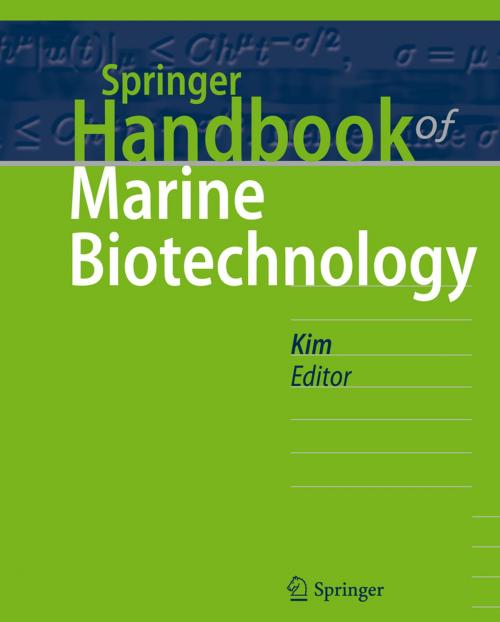Springer Handbook of Marine Biotechnology
Nonfiction, Science & Nature, Technology, Environmental, Science, Biological Sciences, Biotechnology| Author: | ISBN: | 9783642539718 | |
| Publisher: | Springer Berlin Heidelberg | Publication: | January 21, 2015 |
| Imprint: | Springer | Language: | English |
| Author: | |
| ISBN: | 9783642539718 |
| Publisher: | Springer Berlin Heidelberg |
| Publication: | January 21, 2015 |
| Imprint: | Springer |
| Language: | English |
This Springer Handbook provides, for the first time, a complete and consistent overview over the methods, applications, and products in the field of marine biotechnology. A large portion of the surface of the earth (ca. 70%) is covered by the oceans. More than 80% of the living organisms on the earth are found in aquatic ecosystems. The aquatic systems thus constitute a rich reservoir for various chemical materials and (bio-)chemical processes.
Edited by a renowned expert with a longstanding experience, and including over 60 contributions from leading international scientists, the Springer Handbook of Marine Biotechnology is a major authoritative desk reference for everyone interested or working in the field of marine biotechnology and bioprocessing - from undergraduate and graduate students, over scientists and teachers, to professionals.
Marine biotechnology is concerned with the study of biochemical materials and processes from marine sources, that play a vital role in the isolation of novel drugs, and to bring them to industrial and pharmaceutical development. Today, a multitude of bioprocess techniques is employed to isolate and produce marine natural compounds, novel biomaterials, or proteins and enzymes from marine organisms, and to bring them to applications as pharmaceuticals, cosmeceuticals or nutraceuticals, or for the production of bioenergy from marine sources. All these topics are addressed by the Springer Handbook of Marine Biotechnology.
The book is divided into ten parts. Each part is consistently organized, so that the handbook provides a sound introduction to marine biotechnology - from historical backgrounds and the fundamentals, over the description of the methods and technology, to their applications - but it can also be used as a reference work.
Key topics include:
- Marine flora and fauna
- Tools and methods in marine biotechnology
- Marine genomics
- Marine microbiology
- Bioenergy and biofuels
- Marine bioproducts in industrial applications
- Marine bioproducts in medical and pharmaceutical applications
- and many more...
This Springer Handbook provides, for the first time, a complete and consistent overview over the methods, applications, and products in the field of marine biotechnology. A large portion of the surface of the earth (ca. 70%) is covered by the oceans. More than 80% of the living organisms on the earth are found in aquatic ecosystems. The aquatic systems thus constitute a rich reservoir for various chemical materials and (bio-)chemical processes.
Edited by a renowned expert with a longstanding experience, and including over 60 contributions from leading international scientists, the Springer Handbook of Marine Biotechnology is a major authoritative desk reference for everyone interested or working in the field of marine biotechnology and bioprocessing - from undergraduate and graduate students, over scientists and teachers, to professionals.
Marine biotechnology is concerned with the study of biochemical materials and processes from marine sources, that play a vital role in the isolation of novel drugs, and to bring them to industrial and pharmaceutical development. Today, a multitude of bioprocess techniques is employed to isolate and produce marine natural compounds, novel biomaterials, or proteins and enzymes from marine organisms, and to bring them to applications as pharmaceuticals, cosmeceuticals or nutraceuticals, or for the production of bioenergy from marine sources. All these topics are addressed by the Springer Handbook of Marine Biotechnology.
The book is divided into ten parts. Each part is consistently organized, so that the handbook provides a sound introduction to marine biotechnology - from historical backgrounds and the fundamentals, over the description of the methods and technology, to their applications - but it can also be used as a reference work.
Key topics include:
- Marine flora and fauna
- Tools and methods in marine biotechnology
- Marine genomics
- Marine microbiology
- Bioenergy and biofuels
- Marine bioproducts in industrial applications
- Marine bioproducts in medical and pharmaceutical applications
- and many more...















